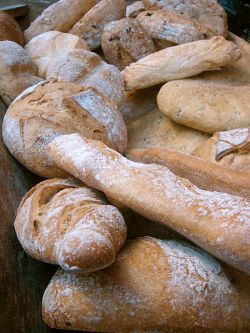The Challenge of Hunger

My family recently undertook the Hunger Challenge posed by the local Arlington Food Assistance Center (AFAC). AFAC asked us to eat for $4.03 a day, the typical benefit allotted Virginians of limited means by the federal Supplemental Nutrition Assistance Program (SNAP). Since the winter, my sons and I have volunteered with AFAC to pick up surplus produce from a local farmer’s market to supplement, along with milk, bread, meat, etc., what their clients can afford through SNAP.
SNAP is the modern version of the food stamp program. According to the the USDA FAQ it serves one out of eleven Americans each month, more than half of whom are children or the elderly. Most report income far below the poverty level. The average participant stays in the program for nine months.
After several days I can say the four-dollar limit provides a lot more food for thought than for the table. The details of pricing food and planning menus have been tackled expertly by my spouse, and others have described their findings well in the diaries here. Meanwhile I am left wondering what the challenge really means.
I find it difficult to write this without coming across as foolish. I don’t think the point of the challenge is to experience being poor. We all know what it is like to feel hunger but only a few have ever been trapped there. While trying (poorly) to live within the limit, I know the exit is as close as the pantry door or waiting a few days. I don’t worry that the kids will go to bed hungry or grow up malnourished.
So what is the point of the challenge? Budgeting? It does force one to make hard and ingenious choices in buying the daily bread and everything else. It brought to light that my family spends a lot more on food than I thought. The price of ordinary things is more than I would expect because such items ordinarily fall into the background. I’m looking right now at a one-dollar bagel that suddenly seems quite extravagant.
But I don’t think that the self-imposed challenge is about elucidating clever, healthy, low-cost meals. True, that’s a great thing to do and share. It’s not easy to choose and obtain the ingredients, including ones that appeal to children and don’t bland the adults to death. You need to be careful in your assumptions. For example you can’t drive to the supermarket every time there is a sale on one item you need. In the end focusing just on budget turns the challenge into a lesson on frugality, not hunger.
Nutrition is another possibility. SNAP includes “nutritional” in its name, certainly a high priority. But the government sends mixed messages. Some school lunch programs have long taken shortcuts like chocolate milk and sugared cereals. Many people, the wealthy included, do not understand nutrition. Poverty usually undermines education as well. The problem is multiplied by the limited choices ordinarily available to the poor.
 We know for example that eating fresh whole fruits and vegetables is essential, but decent produce is very expensive relative to unhealthy yet ironically subsidized alternatives. Many neighborhoods may not have good produce for sale within walking distance. (Incidentally, SNAP benefits can’t buy vitamins.)
We know for example that eating fresh whole fruits and vegetables is essential, but decent produce is very expensive relative to unhealthy yet ironically subsidized alternatives. Many neighborhoods may not have good produce for sale within walking distance. (Incidentally, SNAP benefits can’t buy vitamins.)
Meanwhile a cup of green beans at the farmer’s market goes for $4. My son and I pick up the surplus vegetables there at the end of the day for AFAC. We regularly take nearly two thousand pounds of what may be the only fresh vegetables AFAC clients see that week. It’s a more valuable cargo than I realized, for both quantity and scarcity.
For me the question of the challenge’s meaning boiled down to an orange. Not a metaphorical orange: a real orange, a plain medium-sized one waiting in a basket on our table. I feel good about eating an orange as a snack and I’ve been preaching whole fruit to my kids since they learned to chew. However, at the price of yet another dollar this orange was a budget-busting luxury.
Whether I ate the orange was a problem of discipline, thus merely a test and not my reality. I’d be plain out of luck if I were broke and had no right to the orange. It might as well be in a glass case. But at the moment I simply wanted the damn orange, not a lesson in philosophy.
Indeed I have cheated here and there, not with filet mignon but a handful of peanuts or a piece of cheese. A small glass of cheap wine worked out to a startling $1.50. (SNAP of course won’t pay for alcohol.) And then there’s the aforementioned bagel, which helped me write this essay. I can fast for quite a while, but when I’m hungry enough I can’t get anything done. I can’t afford to do that right now. I’ll have to assume I’ve squandered some benefit out of pragmatism, and I’m OK with that.
Fortunately for me and everyone in my life, I have a choice, at least for now. Perhaps I could get used to being hungry most of the time. I doubt it, especially having experienced having enough. Regardless of my attitude I know it would change me, haunting me while shortening my lifespan and degrading my health.
That is what the hunger challenge brings home to me. Having thought more about the difference between driving through a bad neighborhood and living there, or rather realizing that the neighborhood would become part of me, I’m more likely to comment the next time someone carelessly says “I’m starving.”


nice piece…you to have done well to expose your kids to lives lived all around them that they otherwise might not be sensitized to. (like Romney saying ‘if you need money to start a business, get a loan from your parents…) I have been taking carbs out of my diet of late. I lost a few pounds in a matter of weeks. Taking out bread and potatoes in itself was a big reduction. At a breakfast meeting that offered only donuts and coffee last week I had one. I was amazed that about 90 minutes later I “was starving”. This is one of the reasons carbs suck – they leave you little of value, and you are very hungry again soon after.
Hey did you write a piece on bi-polar or depression once? If so, I can’t find it by title anyway.
LikeLike
Thanks. I took the kids to a distribution too, to see who the food goes to. I’m careful to point out this isn’t “poverty tourism” but a touch with the real world. Personally I prefer being on the bulk operation side of things. We also pick up some lovely produce.
Carbs are a problem. I realized I already knew from bio that they were basically nutritionally barren complex sugars, especially the processed white bread variety, and because they are easy to metabolize they contribute to obesity and diabetes. Plus the lack of nutrition and the plausible hazard of wheat gluten for multiple sclerosis (check out Terry Wahls) … the staff of life ain’t looking so good. I don’t bring bagels home any more. The kids love them but I feel like I’m maybe poisoning them. I love bread and don’t have a weight issue but may have to give it up. Fortunately the alternatives are nowhere near as gross as they used to be.
As far as the poor are concerned on nutrition, we’re sending crazy messages. It has been seriously suggested that SNAP is really a corporate subsidy because of the implicit emphasis on processed food with HFCS and so on.
Bipolar? All my essays are about bipolar. 😉 I haven’t yet addressed it squarely. Hmm… maybe
https://andrewdouglass.com/2011/01/17/i-want-a-new-word/
https://andrewdouglass.com/2011/01/28/i-did-a-good-thing-or-two/
https://andrewdouglass.com/2012/02/02/because-life-is-amazing/
LikeLike